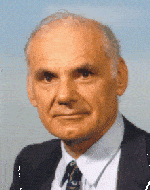|
Just as time-shared computer systems have permitted groups of hundreds of individual users to share hardware and software resources with one another, networks connecting dozens of such systems will permit resource sharing between thousands of users. – Larry Roberts, ARPA Program Plan 723, 3 June 1968. |
Lawrence (Larry) Roberts was the ARPANET program manager, and led the overall system design.
Roberts obtained his B.S., M.S., and Ph.D. degrees from MIT, and then joined the Lincoln Laboratory, where he carried out research into computer networks. In a pivotal meeting in November, 1964, Roberts met with J.C.R. Licklider, who inspired Roberts with his dream to build a wide area communications network.
In February, 1965, the director of the IPTO, Ivan Sutherland, gave a contract to Roberts to develop a computer network, and, in July, to Thomas Marill (who had also been inspired by Licklider) to program the network. In October, 1965, the Lincoln Labs TX-2/ANS/Q-32 computer talked to Marill’s SDC’s Q32 computer in one of the worlds first digital network communications.
In October, 1966, Roberts and Marill published a paper titled Toward a Cooperative Network of Time-Shared Computers at the Fall AFIPS Conference, documenting their networking experiments.
Also in 1966, DARPA head Charlie Hertzfeld promised IPTO Director Bob Taylor a million dollars to build a distributed communications network if he could get it organized. Taylor was greatly impressed by Lawrence Roberts work, and asked him to come on board to lead the effort. Roberts resisted, but finally joined as ARPA IPTO Chief Scientist in December 1966 when Taylor got Hertzfeld to twist the arm of the head of Lincoln Lab to put pressure on Roberts. Roberts immediately started working on the system design for a wide area digital communications network that would come to be called the ARPANET.
In April, 1967, Roberts held an “ARPANET Design Session” at the IPTO Principal Investigator meeting in Ann Arbor, Michigan. The standards for identification and authentication of users, transmission of characters, and error checking and retransmission procedures were outlined at this meeting, and it was at this meeting that Wesley Clark suggested using a separate minicomputer called the Interface Message Processor to interface to the network.
Roberts presented a paper called Multiple Computer Networks and Intercomputer Communication that summarized the ARPANET plan at the ACM Symposium on Operating System Principles at Gatlinburg, Tennessee, in October 1967. He then wrote a program plan called “Resource Sharing Computer Networks” to build a working implementation of the network. The project justified itself, in part, by arguing that different departments would be able to log into other computers and use their programs remotely, thereby saving the costs of buying or building programs themselves, and greatly expanding the capabilities available to each site on the network. He gave the report to Taylor on June 3, 1968, who approved it on June 21. The work was begun.
Roberts also hired the developer of TCP/IP, Robert Kahn, who had worked on the Interface Message Processor at BBN.
Roberts became Director of the IPTO when Taylor left in September, 1969. He left the IPTO in October, 1973, to become CEO of Telenet, the first packet switching network carrier, which later standardized on the X.25 networking system originally used on the EUnet. He later left Telenet when it was sold to GTE in 1979 and became the data division of Sprint.
In 1982, Roberts was President and CEO of DHL. From 1983 to 1993, he was Chairman and CEO of NetExpress, Inc., an electronics company specializing in packetized facsimile and ATM equipment. From 1993 to 1998, he was President of networking company ATM Systems. In the late 1990’s, Roberts was Chairman and CTO of Packetcom, specializing in advanced Internet routers with improved quality of service, and later became Chief Technology Officer and Chairman of Caspian Networks.
Among other awards and honours, he has received the Secretary of Defense Meritorious Service Medal, the Harry Goode Memorial Award from the American Federation of Information Processing, the IEEE Computer Pioneer Award, the Interface Conference Award, the L.M. Ericsson prize for research in data communications in 1982, the IEEE Computer Society W. Wallace McDowell Award in 1992, and the ACM SIGCOMM communications award in 1998. He shared the Charles Stark Draper Prize for 2001 with Kahn, Roberts, Vinton Cerf, and Leonard Kleinrock for their work on the ARPANET and Internet.
